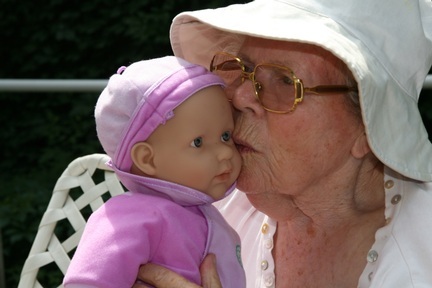Care home gives dementia residents high chairs and baby food to feed their dolls
A care home in Derbyshire rated by the care regulator as ‘outstanding’ gives residents with dementia high chairs and pureed food so they can feed their therapy dolls.

Ashbourne Lodge in Ashbourne provides personal and nursing care to as many as 54 people and has a cinema, a bar as well as a reminiscence room, a ballroom and a fully accessible sensory garden.
The care home which has just been given top marks by the Care Quality Commission revealed staff recognise the importance of doll therapy even going as far as preparing pureed food for the dolls and giving the dolls high chairs so residents can feed them.
One resident told inspectors: "We have a high chair for them and found that some people ate well when feeding their baby too. Pureed meals were prepared so the doll could have a meal with people who were looking after them. We saw this had resulted in people eating more food independently at meal times."
Doll therapy is used in a growing number of care homes for people with dementia, yet it is still seen as a controversial intervention as some believe it can infantalize people. However care home staff often find people with dementia enjoy cuddling the dolls and it stops them being distressed and agitated.
There are various theories as to why doll therapy works. Some believe it brings back happy memories of parenthood and of being useful and needed. For some residents, doll therapy is very much about nurturing and giving residents back a sense of meaning and purpose.
Inspectors found staff at Ashbourne Lodge run by Milford Care understood the importance of doll therapy and where people had a doll they looked after, and they considered their baby, this was respected.
Therapy dolls help residents retain independence and boost wellbeing
‘We saw before moving to the home, staff had created an area where their baby could live and share their life. A cot was provided in their bedroom and a high chair and push chair purchased to ensure they could continue to look after their baby. Staff explained because they looked after their baby, they looked after themselves and retained a level of independence and improved wellbeing,’ said the report.
Inspectors praised staff at the care home for being ‘extremely caring’ and for providing ‘exceptional care’.
The report by the Care Quality Commission found ‘staff knew people very well and care was organised to ensure people had a purpose and had meaningful activities to participate in’.
Staff 'empowered people to take control of their life'
In addition, inspectors found ‘staff were thoughtful and empowered people to take control of their life and retain their independence’.

A GP told CQC inspectors: ‘The level of organisation, standard of care and response to everything is always excellent. They are open to ideas and will think outside the box; they never turn down an idea or suggestion.’
End of life care at the home was praised by inspectors who said ‘anticipatory medicine was stored in the home, so this was available for people nearing the end of their life. This meant that medicine was available to manage the person's symptoms and pain at the time it was needed’.
Staff told inspectors that the care home has ‘done so much good work here around end of life. I used to avoid the issue but now I can see we need to make it less scary for people and relatives, so we have put our Dignity Book in the hall for people to write in. We light an electric candle next to it, so everyone can see it when they come in.
Good end of life care means residents are 'able to die with dignity'
'Where people were receiving end of life care or following their death, there were regular palliative care meetings which all staff were invited to attend. This provided opportunities to discuss people's care to ensure they were able to die with dignity. A 'Celebration of life' service was organised each November along with remembrance service to celebrate the lives of people who had died that year.'
Jim Watt, manager of Ashbourne Lodge said: “We’re over the moon to have received this esteemed review. I’d like to thank all of the team who are 100 per cent dedicated to ensuring excellent care, and for making sure the well-being of the residents is at the forefront of their minds at all times.”
• ‘Like what you read? For more news click here and you can listen to our latest podcast ‘Let’s Talk About Care’ by clicking here
Latest News
 29-Jul-24
Dementia Bus gives carehome.co.uk staff insight into life with dementia
29-Jul-24
Dementia Bus gives carehome.co.uk staff insight into life with dementia
 01-Mar-24
Find out the top care homes in 2024
01-Mar-24
Find out the top care homes in 2024
 21-Mar-23
UK's top care homes in 2023 revealed
21-Mar-23
UK's top care homes in 2023 revealed
 03-Jan-23
carehome.co.uk launches free care helpline
03-Jan-23
carehome.co.uk launches free care helpline
 13-Dec-22
5 mins with Emily Whitehurst, chief operating officer for Constantia Healthcare
13-Dec-22
5 mins with Emily Whitehurst, chief operating officer for Constantia Healthcare